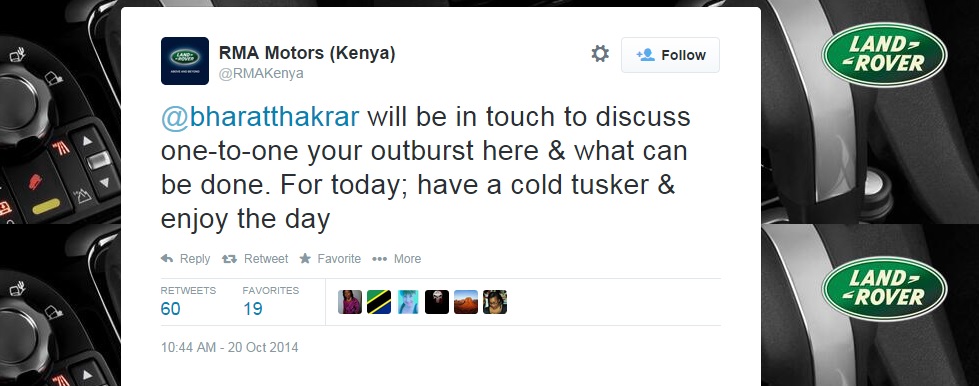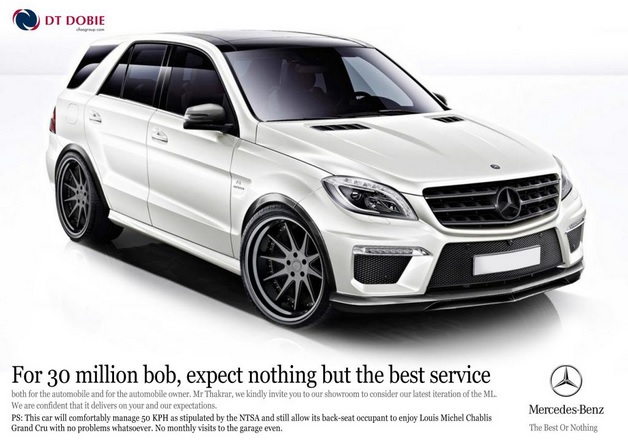
The tweet posted above was the culmination of an unfortunate social media exchange between RMA Motors and Bharat Thakrar, the CEO of Scangroup, a marketing services firm based in Kenya. Thakrar (@bharatthakrar), the (not so) proud owner of a Range Rover vehicle (reportedly worth KES 30 Million) took to twitter to express his dissatisfaction with the repair service he had been receiving from Land Rover’s exclusive franchisee in Kenya, RMA Motors (@RMAKenya). The twitter exchange went something like this:
Thakrar: “I am getting fed up of my Range letting me down. The most expensive car is the worst serviced in Kenya. @RangeRover @rangerovernews pls help.”
Thakrar: “Need some help from @RangeRover @rangerovernews @alykhansatchu @RangeRoverUSA to get my Range fixed. The car spends two days a month at RMA.”
RMA: “@bharatthakrar please DM us your contacts so that our CEO and head of servicing can be in touch soonest. Many thanks.”
Thakrar: “Assume you mean this and not just managing your social media. Remember I run a digital, PR & Comms [Communications] buss. [business]”
RMA: “@bharatthakrar spoken to the CEO, his message is that our team is enjoying #MashujaaDay today; putting families first, but a technical rep will be in touch to discuss one-to-one your outburst here & what can be done. For today; have a cold tusker & enjoy the day.”
Sections of main-stream media (not to mention most of “Kenyans on Twitter” #KOT) were appalled by RMA’s “reply to a high-profile client asking him to take a cold beer in lieu of service” terming it as “bad customer service” and “a show of their poor understanding of social media.” Hence #RMAGate was born.

In a quick rejoinder, RMA Motors unashamedly denied any wrongdoing in its twitter exchange with Thakrar. In a media report, RMA Motors CEO Sanjiv Shah is reported as saying:
“We are puzzled as to why Mr Thakrar decided to air his views on social media in the early hours of the morning on a public holiday (….) We have always understood that Mr Thakrar has had a fluent communication chain with RMA, witnessed by the fact that he even knows the names of various RMA team members and has their personal telephone contacts (….) None of our other high profile customers have ever resorted to discussing their issues and slating us in the public arena. Generally owners of these type of vehicles (and we have many delighted such customers) are private, discreet and very friendly.”
From a consumer protection law perspective, the RMAGate incident ought to be an eye-opener to all suppliers of goods and services on social media in Kenya. Our point of departure is Article 46 of the Constitution of Kenya 2010 and its enabling statute, the Consumer Protection Act 2012, which are lauded as landmark achievements by Kenya in the area of consumer protection in the sense that these new laws spell out consumers rights and obligations vis a vis product and service liability, make provisions for the promotion and enforcement of consumer rights as well as empower consumers to seek redress for infringement of their rights as consumers; and also make provisions for compensation.
Part II of the Act gives consumers a wide range of rights including the right to commence legal action on behalf of a class of persons in relation to any contract for the supply of goods or services to the consumer. This right cannot be ousted by any agreement between the parties. Other consumer rights provided for in the Act include the right to full precontractual information for the consumer to make an informed choice, the right to complain with regard to quality, delays in provision of rectification, quantity and price of such goods or services as are offered, the right to a reasonable notification of termination of service – particularly in relation to the provision of basic telecommunications services and/or internet access, among other rights.
The Act prohibits ‘unfair practices’ and proceeds to provide for radical sanctions against a supplier who engages in ‘unfair practices’. Such practices include representing that goods or services have a sponsorship, approval, performance or characteristics that they do not have; or representing that goods or services are of a particular standard, quality, grade, style or model, if they are not, and so on.
Therefore where a consumer enters into an agreement, whether oral or written, after or while a person has engaged in an unfair practice, the Act provides that the consumer has the right to terminate the agreement and seek any remedy available to them in law, including a suit for damages.
By RMA’s own admission, Thakrar is among its high profile customers therefore the above legal provisions relating to consumer protection would be applicable both online and offline. Interestingly, the Act has a special section on repairs to motor vehicles and other goods. Section 51 of the Act states that on the repair of a vehicle, every repairer shall be deemed to warrant all new and reconditioned parts installed and the labour required to install them for a minimum of 90 days or 5,000 kilometres, whichever comes first. Therefore the mere fact that Thakrar has tweeted that his Range Rover spends an average of 2 days a month at RMA Motors appears to place the latter in breach of the consumer protection law.
Allegations made by customers on social media that a supplier has breached consumer protection laws are serious matters. Therefore it was highly ill-advised for RMA to draw so much public attention to this alleged consumer rights breach as this poses legal risk to RMA’s business not to mention the damaging effects on its client base.